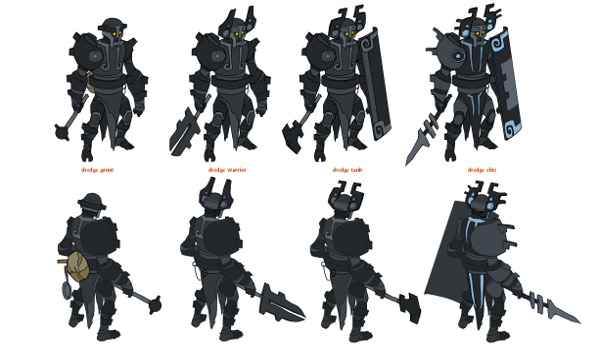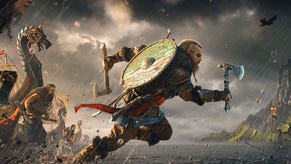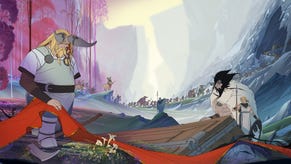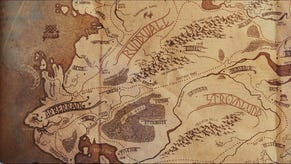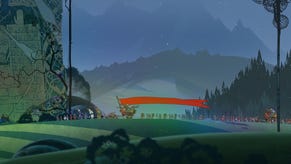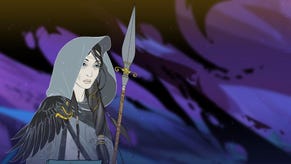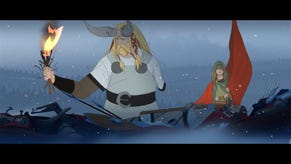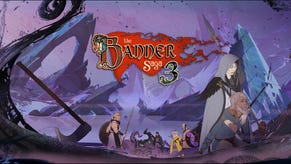Dredging Up The Secrets Of Banner Saga's Story
The Banner Saga Blowout, Pt 3
The Banner Saga saga's not over yet. Not by a long shot. First, we brought you multiplayer impressions straight from the front grid lines, and then you learned everything there is to know about balance, microtransactions, and - in the process - yourself. So then, what could possibly be left? What frigid depths of Stoic's mighty ice fortress have we yet to plumb? Well, mainly the actual Saga - the sprawling, multi-chapter single-player behemoth born of Kickstarter's unholy flames earlier this year. So I asked Stoic about every last bit of it: how it'll progress, what sort of Big Evil Force we're dealing with, where choices will come up and how much they'll affect the storyline, why all the voice actors are from Iceland, how they mo-capped those gorgeous animations (hint: lots of falling on their faces), and tons more. Dig in after the break.
Basic Structure, Lack Of An Overworld
RPS: So how is single-player structured? Is there an overworld? How does it progress?
Alex Thomas: One thing that we found people did not connect with, even though we tried to explain it as much as we could... The travel scenes that were in the announcement trailer are actual gameplay.
Arnie Jorgensen: I put up the wallpaper and called it in-game art, and everyone says, "Oh, this is awesome, I can't wait to see in-game shots." And I say, "That was an in-game shot!"
Alex Thomas: The idea behind it is you're an entire civilization of Vikings escaping from this rolling darkness that's swallowing up the world behind it. Like the Neverending Story, the Nothing. We realized, when we started making the game, that we wanted a big, epic-sized world. But we didn't have the resources to have exploration the way that you would in Dragon Age or something. Our equivalent is going to be this travel instead.
The way the travel works is, you have a civilization of people who all have needs. They're going to spawn these events that happen. To simplify it, it's a bit like of King of Dragon Pass meets Oregon Trail. It's King of Dragon Pass on the road. As you travel, their endurance is going to get lower. Their morale is going to get lower. You have to do things to keep it up. But if you camp, this wall of darkness is getting every closer. You're balancing the speed at which you can travel with the needs of your caravan.
RPS: What happens if the wall of darkness catches up?
Alex Thomas: What we are weighing heavily upon is that time is an important factor. As you're going, what happens around you changes depending on when you get there. Having choice in a game is an expensive proposition, because once there's a branch, you have to say... Okay, there's this content, there's this content, and you don't see both. You pay a lot in time to put that in. What we want to do is, you're working through a story that makes sense in context. You're trying to achieve a particular goal. But when you get to certain things, that will change what's happened and what state it's in.
You're not going to be able to sit there and kill days and days. Your caravan's going to go, "We're all freaking out. If you don't decide to leave right now, we're all going to leave without you." You can lose and gain people in the caravan. The more people you have, the longer your banner gets.
Arnie Jorgensen: You will be interacting with this darkness in Chapter Three. In Chapter One, it's there, but it's not going to be one of the things that's right in your path. By Chapter Three you'll have decisions to make and you'll be interacting with that. We have all three chapters laid out as one story. We were actually going to do it as one game. One of our guys, Gordon Walton, here in town has made a lot of games, and he said, "No, you've got to do it much faster." So we said, "Okay, we'll have three chapters." Each chapter will have a complete beginning, middle, and end. Kind of like Lord of the Rings.
Alex Thomas: Yeah. A trilogy, basically. So we have this really long production cycle for a game that we wanted to get out. It just didn't make sense to go radio silent for two years and try to hammer on it. There were these natural breaks in the story that made for a very compelling trilogy.
The Bad Guys
RPS: What about these inky looking creatures I keep seeing in the art around the office? Are they part of that wall of darkness?
Alex Thomas: The Dredge are one of the things that we've done working towards the single-player game. They're going to be your primary foes throughout the game. They're these giant heavily-armored colossus kinds of characters.
RPS: The have a very Shadow of the Colossus feel to them, actually.
Alex Thomas: Yeah. That was very intentional.
Arnie Jorgensen: We wanted them to be very alien-feeling compared to the rest of the Nordic guys. We didn't want them to just look like big Vikings. They're intentionally odd and different from what else is in the game. Something vastly different.
Alex Thomas: We didn't want to retread the same fantasy stereotypes. Orcs and goblins and things. This is something we spent a bit of time on. Arnie came up with a few different designs until we got something that felt unique.
John Watson: The look of them, and the sound design...
Arnie Jorgensen: The sound design is really bizarre.
John Watson: It's kind of echoey, lots of reverb. When they fall, it sounds like a metallic alien tree coming down.
Arnie Jorgensen: Their whole technology, their armor and ore and metals... They all have an interesting reaction that's different from the metals we use. We'll be talking about that when we start rolling them out.
How Choices Work, How They're Different From Other RPGs
RPS: So does choice in Banner Saga largely revolve around how quickly you decide to move from place-to-place? Or are there more road-mapped, BioWare-style choices as well?
Alex Thomas: That's definitely a large part of it. Another is just how much you support your caravan. You're going to get these random events based on everybody's different stats. There are three things you're trying to balance as you're moving along: endurance, morale, and supplies. People are going to constantly be triggering these events based on what level those stats are at. I guess the key word that we're going for is that everybody has their own motivation, their own agency. They're going to leave. They're going to join up with you. They're going to do what they want to do to handle the situation.
Arnie Jorgensen: That's a good point. In a single-player story, everyone thinks you control the characters. But here, you don't. You're the guy running the caravan. But everyone's got their own agenda. You're just trying to get everyone along to the end of the story.
RPS: Like Oregon Trail! I hope I get to hunt sabertooth buffalo.
Alex Thomas: In a way there's no good or bad decision. Did I make the decision that I felt was morally correct, or the one that made me feel like I did the right thing? Even though it may have a bad result? What was really important for us, though, is that you're not reloading the game.
I was a horrible save-switcher when I was playing Dragon Age. Make a decision, see what happened, reload. You don't reload this game. You live with the choices that you make and the result of that. We're going to have these checkpoints as you go along, but you're not getting quick-saves every 10 seconds.
Arnie Jorgensen: That's actually a question we were asked, coming from the larger game companies: Could we do that to a player? No, they need save points. But this game is small enough that we can take chances on stuff like that. We wanted to be a little bit more old-school, so that you can just play through.
You can't save everywhere. To go back to a checkpoint would cost you some time, so you just move on forward. Also, we're hopefully going to be training the player that this isn't the type of game that has an ultimate outcome. Really, as we said, you're just trying to balance your way through the game. There isn't a "good" and a "bad" choice, is my point.
RPS: With your caravan, how much individual identity does each member of it have? You said that people can just come and go as they please. That reminds me of Animal Crossing, in its own weird way. Is that the kind of thing that you're going for, though? Where you can talk to these characters occasionally and, if one of them leaves because you pissed him off, you're not going to be happy about it?
Alex Thomas: Yeah. I think that's exactly what [we're going for]. To go to what Arnie was saying about taking a risk on the game design, we don't think a big studio, for example BioWare, is going to let you lose someone that you like. As a smaller indie studio we thought that was freaking cool. We might ruffle some feathers, but we want to have that in the game. It's exactly like you said. You may go out of your way to make a guy happy because you like him. He's part of your combat team. And it's going to mess with the rest of the caravan. Maybe he's pissing a bunch of people off, or whatever the explanation. We want you to decide what you think is the right course of action, so we're giving you lots of options like that.
RPS: But I could also see that creating a scenario where the "right" choices are the ones that keep your combat team strong, together, and able.
Alex Thomas: Right. We also came at the idea of the game from the point of view of someone who isn't really into the strategy part. We are trying to tell a story. A lot of times what you hear about games is that someone really is interested in the story, and every time they have to do combat or shooting they go, "Ugh, do I have to play through this until I get back to the part I like?" Part of the design is intentionally making it so you can play a certain way and make the combat really easy, or skip it altogether.
For example, if you make decisions that raise a bunch of warriors in your caravan, it's going to make combat a lot easier. They'll be able to take out enemies, so that instead of fighting 10 guys, because of the way you arranged your caravan you might only have to fight a couple. We're working out the details on that, but the idea is... If you play through it with the intention of not fighting, that's a perfectly viable tactic. Hopefully that answers the question about letting go of characters who you like in combat.
The idea is, these three systems feed back into each other. The decisions that you make in conversation affect where you're going to travel or whether you get into combat or not. The decisions you make in travel feed back into the combat. The combat feeds back to... When you come out of combat, you don't instantly heal. It takes time. You can camp and lose some time and heal everybody up, or you can travel, heal a little slower, but make the decision to keep going. If you get into a combat again, too early, you're hurting yourself because your characters come in half-damaged.
A Story Where You Can "Fail," Let Everyone Die
RPS: How big is the effect of each choice? You seem to be against the idea of tiny, inconsequential BioWare choices, but are you going for as pronounced of an effect as, say, The Witcher 2?
Alex Thomas: It's ridiculous that they did that much work for a one-time choice. It's awesome, but we can't afford to do that. It goes back to the idea that you're going to see certain things happening, and the state that they're in depends on when you get there. We're accounting for how you see it, not whether you see it.
Arnie Jorgensen: The ending of the game is going to have some fairly dramatic differences.
Alex Thomas: All the choices that you're making build up to this finale where we're going all-out. A lot of people have been taunting us, like, "Oh, different choices? Red, green, or blue?" [laughs] But no, we set out from the beginning with the story to make the ending have very dramatic differences based on choices.
Without giving anything away, basically, we're again able to take the risk on an indie game of letting you fail. That's been a big theme for us throughout. Something missing in role-playing games is that you can't fail. If you can't fail, there's no tension. It doesn't matter what you do. We really are making it so that if you made a series of decisions that lead to people you love dying, that happens. Or it could lead to everybody doing. You could fail the entire game.
Arnie Jorgensen: It's not the way to look at it with our game, though. We're hoping that people look at it more like a novel. In certain novels, that was a great read, but this is the end of the novel...
Brian Mumm: Everybody dies. That's the end.
Arnie Jorgensen: This is your story and that's what happens. What we really hope to get through to players is, you're not making right or wrong decisions. It would be like reading a novel and saying "That was the wrong decision." No, that's part of the novel. That's part of the story. I really think it's important to let people know that.
Alex Thomas: The important thing is that it feels organic. As you make these big decisions, if it leads to everything ending, do you feel like that's the path that you took to get there? It doesn't just jump out at you at the end of the game. It feels like part of the story, organically. That's what we're going for.
Each part is not a 60-hour game, and that was an important factor too. We don't expect people to play through the game to see different endings if it's going to take them 200 hours to play through all three games. Each game is probably going to be between eight and 10 hours. If you make a decision near the end of a chapter that you didn't care for, you can play it again and see completely new content throughout.
Like we were saying with the events that happen, those don't happen in a specific order either. It's based on how your caravan is doing. That triggers certain things. If you have low morale, you're going to trigger a certain event that has to do with that. Everyone in camp is going to drink too much so now they're all sloshed and they can't march as well. If you keep their morale up you're going to see a different event.
Buying Each Single-Player Chapter
RPS: Will people have to buy each story chapter individually?
Alex Thomas: Yes. Again, it's not a 60-hour game, and it's not a $60 price tag. If you like the game and you want to play Chapter Two, I think it's well within your means to purchase the second part.
Arnie Jorgensen: We hope to be shipping early next year. Banner Saga: Factions we hope to ship in November. But Chapter One will hopefully be out early next year.
RPS: What about the narrative prologue you're going to add to Factions? Is that going to be free, or will that be a purchased add-on?
Alex Thomas: We're working through that right now. What it comes down to is, we do plan on having a lot of free content. Any time we add a new character to the single-player, we'll release it into Factions. As we make items and stuff, we'll put them into Factions. To give something away that's a huge chunk of content that most people don't appreciate anyway... We're not sure if that's the right thing to do right now, because we are not taking salaries at all.
John Watson: If we think people will be interested in paying for it...
Alex Thomas: Yeah. Will they appreciate the work that goes into it?
Brian Mumm: It's a lot of content to say, "Okay, we spent frickin' months working on this, here you go."
Alex Thomas: But the idea would literally be, if you really like the game and you want to pay for a very low-fee DLC that we legitimately added later because we're working on new content - [not cutting it from the full game], that's the idea. It's cheap DLC for people who would like it.
Importing Voice Actors From Iceland
RPS: While we're on the subject of the single-player, you mentioned during the Fantastic Arcade panel that you've handed voice-acting duties over to a group based out of Iceland. Why? Also, how's that working out for you?
Alex Thomas: We try to be up front about this, but basically, we don't have the funds to V/O everything in the game. Not all the dialogue. So we're not going to try and do the dialogue. Coming from BioWare, we know what a massive endeavor that is. It's huge and time-consuming and really expensive. $750K doesn't even scratch the surface of what you need to do voice acting on a multi-character game like this. So the narrative that we're going to have in Factions... We got this amazing Icelandic studio, like you said, to do all the narration for us.
Arnie Jorgensen: The other thing, I don't even know how you would pull it off. With V/O in our game... Say you're coming up to and having conversations with two people. We're not playing a short blurb. We're writing everything out. The player's going to be reading each one and keeping up carefully. If a character has to read each one, especially the way we have the animation... You might be sitting there a long time. It's kind of just looping weird. I think players are going to be going back and forth a lot more. I think V/O would actually be odd to try and sync up with this game.
So anyway, one of our Kickstarter backers from Norway said, "I know this company." They specialize in the ancient Viking language, or as close as you can possibly get to it. We sent them the first paragraph to read, like, "OK, try this out." We went back and forth for about a month. "How about this way? This word's a bit different..." We realized, "Oh my God, they think we're National Geographic." They were really worried about every single word being accurate.
The closest language to ancient Norse is Icelandic...
Alex Thomas: Old Icelandic, apparently. There's actually a distinction.
Arnie Jorgensen: Anyway, Icelandic in general is much closer to Norwegian or Danish as far as accents. So these guys are located in Iceland. Since we're an artsy small company, we say, "We're going to have the whole thing done in freaking Icelandic." So we ran with that. We had them read a bunch of stuff. We sent them a paragraph and had them read it back in Icelandic. What happened was, we were sending this around to people we trusted saying, "Hey, check this out. This sounds badass. We love it." Even people like Austin Wintory, our composer, came back and said, "Oh my gosh, this is going to be fantastic, but I actually really liked it when he was speaking English." And it's not so much because they can understand it, but just because his voice sounds so awesome. So this was the first thing that we were listening to. You can see, he starts in broken English and goes into Icelandic. The way he drawls is just so awesome.
Alex Thomas: We actually went back and forth a lot on that. Do we stick with the Icelandic, because it sounds amazing? Or do we do the English? I think it came down to the accessibility of the English. If we kept the Icelandic with subtitles, we really would be losing 80 percent of our audience.
Brian Mumm: You wouldn't be looking at the animations anymore. You would be missing a lot of the visuals.
Alex Thomas: As the guy that wrote it, I do actually care if people understand what's going on. I think we made the right decision. And the English sounds awesome, too, with the guy having an authentic accent.
Arnie Jorgensen: The way we're doing it, we have him read the first line in Icelandic. Then we crossfade that to the English, so you know he's actually still speaking.
Alex Thomas: The entire story is going to be dialogue-driven. Just like a BioWare game. Instead of every line having options and you quickly learn that a lot of choices don't matter at all - they loop back to the same response - we wanted to try and keep it to one important choice per conversation.
Homemade Motion Capture
Alex Thomas: I'm not sure how obvious we made it, but these are all motion-captures of us. These are all John here, in both sets.
John Watson: I'm particularly pleased with the Dredge slingers. I think I did a good job of those...
RPS: Rotoscoping, right? And you did all the moves yourselves?
Arnie Jorgensen: Yeah, all out in the front yard.
Brian Mumm: We have a setup... A ladder with a camera on top, distance markers so we get the tiles in the right spot. The camera's there so it's always at the same angle.
John Watson: We do the moves at two different angles, north and south, for each move. They're not necessarily exactly the same. The attack this way and the attack this way, the timing may be different.
RPS: Why did you opt to go with that, as opposed to getting some people who do mocap professionally?
Alex Thomas: Well, for one, part of the reason we wanted to make this company was to do this kind of thing ourselves. It's a lot of fun to see yourself animated. Originally I was doing all the animation, before we got the Kickstarter funding, so this was a process that we had worked out ourselves. Through experimentation, we figured out how to do it, so we thought, "Well, let's keep going with this, because it's working."
Arnie Jorgensen: So every animation in the game was done this way, with us acting it out and pushing each other.
John Watson: My head was ringing after my first shoot.
Alex Thomas: That's because, for one of John's, he faceplanted on the first try.
John Watson: It wasn't the first. I did like 30, and Arnie was like, "It looks fake. It looks like you're protecting yourself." "Well, I am, I'm trying not to knock myself out."
Alex Thomas: I mean he faceplanted on the first death that we filmed.
John Watson: Oh, yeah, right. Yeah, my head was ringing after that. But it looked more real, I guess [laughs]. Arnie was just laughing at me.
Arnie Jorgensen: I was cracking up.
John Watson: I'm laying there in pain, and he's like, "Yup, that worked."
RPS: [Viewing clip] Wow. Ouch.
John Watson: We should do a making-of B-roll. Put some music to it.


